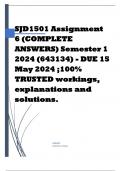SJD1501 Assignment
6 (COMPLETE
ANSWERS) Semester 1
2024 (643134) - DUE 15
May 2024 ;100%
TRUSTED workings,
explanations and
solutions.
ADMIN
[COMPANY NAME]
, Based on the above: 1.What would you say to those who believe Africa lacks
expertise in responding to pandemics? (200 words) 5 Marks
To address the perception that Africa lacks expertise in responding to pandemics, it's crucial to
provide a comprehensive analysis that considers historical context, current capabilities, and ongoing
efforts. Here's a detailed discussion:
1. Historical Context: Africa has faced numerous health challenges over the years, including
pandemics such as Ebola, HIV/AIDS, and malaria. These experiences have led to the development of
expertise in managing outbreaks and implementing public health interventions. For instance, during
the 2014-2016 Ebola outbreak in West Africa, African health workers, along with international
partners, played pivotal roles in containing the spread of the virus and providing care to affected
communities. This demonstrated the resilience and capacity of African health systems to respond to
health emergencies.
2. Building Capacity: In recent years, African countries have been actively working to strengthen their
public health infrastructure and enhance preparedness for pandemics. This includes investments in
healthcare infrastructure, training of healthcare workers, establishment of surveillance systems, and
development of response plans. Initiatives such as the African CDC (Centers for Disease Control and
Prevention) have been established to coordinate continental efforts in disease surveillance, outbreak
investigation, and emergency response. These efforts have contributed to improving the continent's
ability to detect, prevent, and respond to infectious disease threats.
3. Regional Collaboration: African countries recognize the importance of regional collaboration in
addressing public health challenges. Regional bodies such as the African Union (AU) and regional
economic communities facilitate coordination and cooperation among countries in areas such as
information sharing, resource mobilization, and joint response efforts. Collaborative initiatives such
as the Africa Medical Supplies Platform have been established to facilitate the procurement and
distribution of medical equipment and supplies during health emergencies.
4. Innovative Solutions: African countries have demonstrated innovation and adaptability in
responding to pandemics. For example, during the COVID-19 pandemic, countries like Rwanda and
Senegal leveraged technology for contact tracing and surveillance, implemented community-based
interventions, and utilized mobile health platforms to disseminate information and deliver healthcare
services. These innovative approaches have been effective in mitigating the spread of the virus and
minimizing its impact on populations.
5. Challenges and Opportunities: While significant progress has been made, Africa still faces
challenges in responding to pandemics, including limited resources, weak health systems, and socio-
economic disparities. Addressing these challenges requires sustained investment in healthcare
infrastructure, human resources, and research and development. However, it's essential to recognize
the resilience, expertise, and commitment of African healthcare professionals and institutions in
combating pandemics.
In conclusion, while Africa may have faced challenges in responding to pandemics in the past,
significant progress has been made in building capacity, strengthening health systems, and fostering
regional collaboration. African countries have demonstrated resilience, innovation, and adaptability
in addressing public health emergencies, and there is a growing recognition of the expertise and





